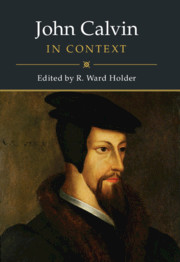Book contents
- John Calvin in Context
- John Calvin in Context
- Copyright page
- Dedication
- Contents
- Contributors
- Acknowledgments
- Abbreviations
- Introduction
- Part I France and Its Influence
- Part II Switzerland, Southern Germany, and Geneva
- Part III Empire and Society
- 15 The Politics of the Emperors
- 16 Judaism in Europe during the Late Middle Ages and Renaissance
- 17 Refugees
- 18 Calvin and Women
- Part IV The Religious Question
- Part V Calvin’s Influences
- Part VI Calvin’s Reception
- Conclusion
- Bibliography
- Index
- References
15 - The Politics of the Emperors
from Part III - Empire and Society
Published online by Cambridge University Press: 14 November 2019
- John Calvin in Context
- John Calvin in Context
- Copyright page
- Dedication
- Contents
- Contributors
- Acknowledgments
- Abbreviations
- Introduction
- Part I France and Its Influence
- Part II Switzerland, Southern Germany, and Geneva
- Part III Empire and Society
- 15 The Politics of the Emperors
- 16 Judaism in Europe during the Late Middle Ages and Renaissance
- 17 Refugees
- 18 Calvin and Women
- Part IV The Religious Question
- Part V Calvin’s Influences
- Part VI Calvin’s Reception
- Conclusion
- Bibliography
- Index
- References
Summary
The early modern Holy Roman Empire of the German Nation, usually just called “the Empire,” was a huge and complex political organization in central Europe. The emperorship was an elected office, and the emperor had the difficult task of ruling over a loose political union of mostly German and largely self-governing principalities and towns, collectively called “the imperial estates.” As a result, imperial politics cannot be neatly defined as either domestic or foreign; rather, dynastic, internal, and European considerations were closely intertwined in the politics of the emperors.
- Type
- Chapter
- Information
- John Calvin in Context , pp. 131 - 138Publisher: Cambridge University PressPrint publication year: 2019

